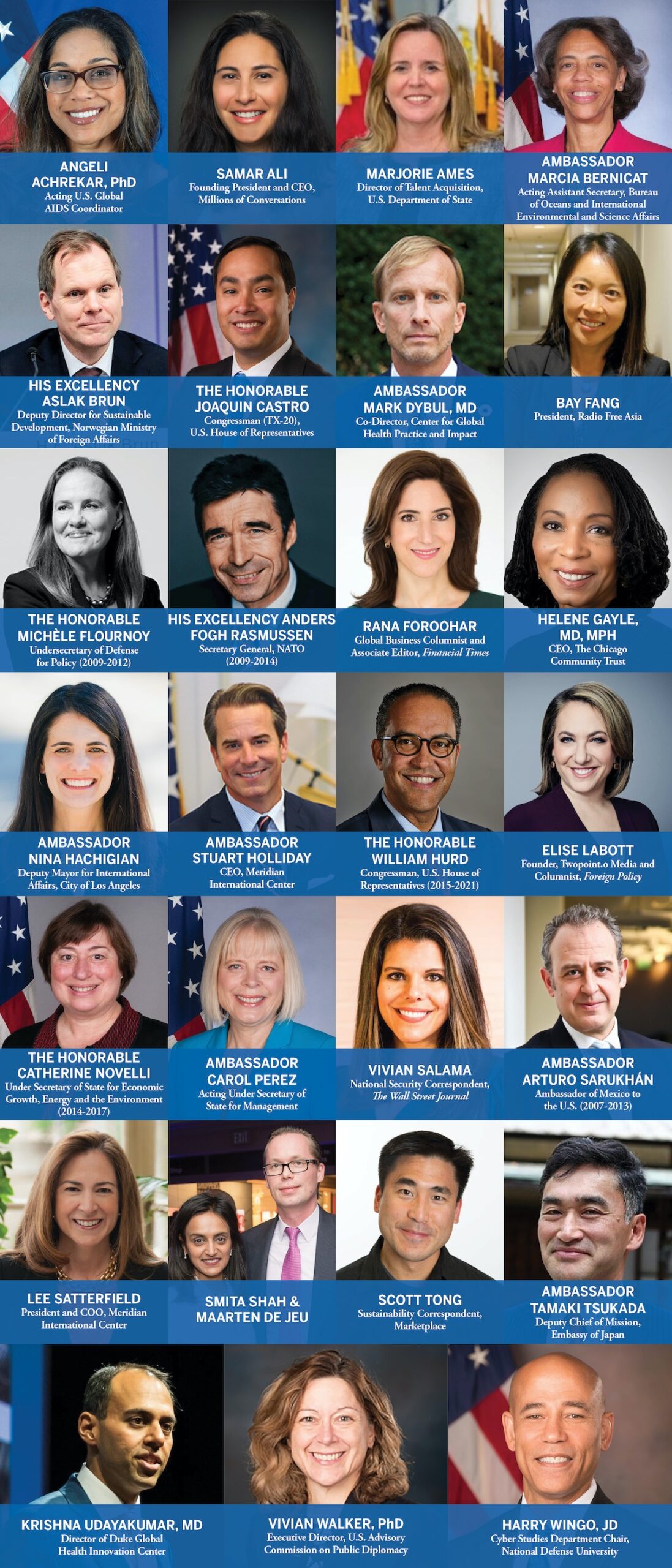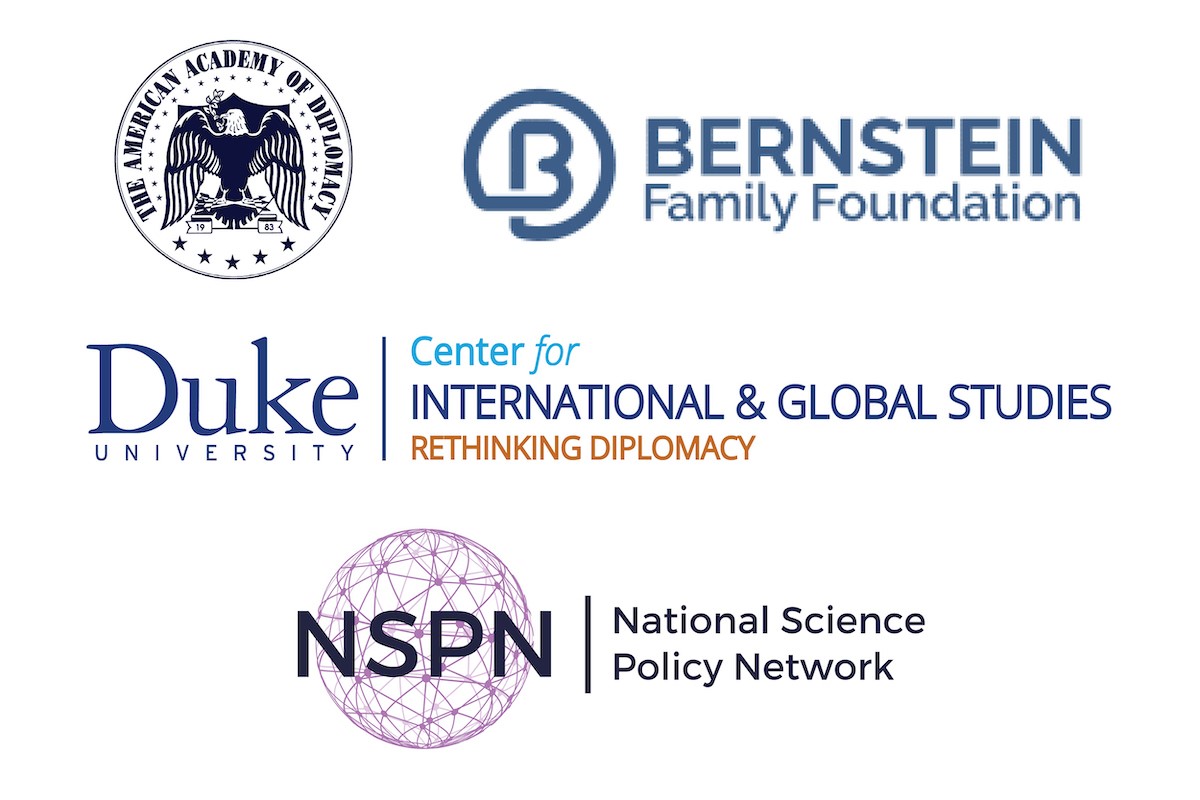2021 Meridian Diplomacy Forum – The Path Forward: Strengthening American Statecraft
On April 16, Meridian hosted its Diplomacy Forum on The Path Forward: Strengthening American Statecraft, which highlighted the restoration of the State Department and U.S. global leadership as well as the need to reconceive and modernize our diplomatic practices and capacity to meet the demands of today’s new challenges. Over 500 visionaries and decisionmakers from the U.S. government, Congress, the embassy community, the private sector, and civil society gathered online to share an all-of-sectors approach to retool and strengthen the United States’ engagement with the world.
Alongside this year's Diplomacy Forum, Meridian hosted its first careers in international affairs networking fair where over 100 students and young professionals connected with American foreign and career service officers and other global affairs practitioners. The networking fair provided the next generation of aspiring diplomats with an opportunity to learn about different pathways to pursue a career in international relations. Powered by Shindig, the virtual networking fair served as part of the official launch of our DiplomacyRISE initiative. Diplomacy Readiness, Innovation, Skill, and Equity (RISE) is an inclusive diplomatic professional development program that provides greater access to critical skills training, career guidance networks and emerging issue expertise to cultivate the next generation of U.S. diplomats that reflect America’s diversity and are equipped with 21st century statecraft skills and knowledge. Meridian held two strategy sessions on the afternoon of the forum to discuss the two key investment areas of DiplomacyRISE: fostering diversity in diplomacy and diversity and inclusion and developing contemporary critical issue area expertise. Recommendations from this cross-section of experts, practitioners and stakeholders in the field can be found here:
Diversity in Diplomacy Report Critical Issue Areas Report
See more on social: #DiplomacyForum
Forum Agenda
WELCOME REMARKS watch
Ambassador Stuart W. Holliday, CEO, Meridian International Center
VALUE BASED LEADERSHIP AT HOME AND ON THE GLOBAL STAGE watch
U.S. diplomats are inherently champions of American values, such as democracy, rule of law, an independent judiciary, freedom of press, and fair and transparent elections. Likewise, Americans engaged in global affairs outside of government are often proud to convey and protect these same beliefs and cultural norms. At a time when democracy is coming under fire within our own borders, what is our moral authority to promote and defend these democratic values abroad? In a world with diminishing differences between domestic and foreign policies, how do we stand with democratic movements without infringing on state sovereignty?
Samar Ali, Founding President and CEO, Millions of Conversations
His Excellency Anders Fogh Rasmussen, Founder, Alliance of Democracies Foundation (Secretary General of NATO, 2009-2014)
A STATE DEPARTMENT FOR EVERYONE watch
As laid out in his October Foreign Affairs piece “How to Bring American Diplomacy Back From the Brink” and as a co-sponsor of legislation, such as the Diversity and Inclusion at the Department of State Act, Congressman Joaquin Castro is leading the charge in Congress to reinvigorate the State Department. During this speech, he highlighted the steps and reforms necessary to recruit and retain the best and brightest to the State Department to meet the needs of America’s 21st century statecraft.
Congressman Joaquin Castro (D-TX), House Foreign Affairs Committee
INTERSECTION OF NATIONAL SECURITY AND FOREIGN POLICY watch
While the United States’ defense apparatus remains the most powerful in the world, America’s diplomatic presence overseas has been largely diminished through underfunded budgets, vacant posts, and the militarization of foreign policy. President Biden’s appointment of former diplomats to top national security posts may signal an increased emphasis on soft power approaches to national security issues. This discussion explored how the Biden administration will handle this defense and diplomacy dichotomy to achieve foreign policy priorities, tackle new global crises, and maintain the safety and security of the country.
The Honorable Michèle Flournoy, Founder and Managing Partner, WestExec Advisors (Under Secretary of Defense for Policy, 2009-2012)
in conversation with Vivian Salama, National Security Correspondent, Wall Street Journal
GREEN LIGHT ON CLIMATE DIPLOMACY watch
President Biden immediately signaled the fight against climate change as a fundamental aspect of his foreign policy agenda by rejoining the Paris Agreement, appointing Secretary John Kerry as the Special President Envoy for Climate, and announcing the April 22nd summit of world leaders to advance anti-global warming efforts. While Biden and Kerry will lead this transformation, the U.S. Department of State and American diplomats will be tasked with carrying out the new charge. This session highlighted methods to infuse climate action in the Department’s mission and operations, including learning from other foreign governments who have successfully implemented climate mitigation measures, as well as looking to state, local and nongovernmental actors for inspiration and partnerships as America builds a broader network of allies to combat climate change.
Ambassador Marcia Stephens Bloom Bernicat, Acting Assistant Secretary, Bureau of Oceans and International Environmental and Scientific Affairs, U.S. Department of State
His Excellency Aslak Brun, Deputy Director-General for Sustainable Development, Norwegian Ministry of Foreign Affairs
Ambassador Nina Hachigian, Deputy Mayor for International Affairs, Los Angeles
Moderator: Scott Tong, Correspondent (Sustainability), Marketplace
DIAGNOSING THE CHRONIC EFFECTS OF GLOBAL HEALTH IN DIPLOMACY watch
From repatriation efforts and pandemic prevention plans to PPE and vaccine procurement assignments, nearly all U.S. and international diplomats practiced global health diplomacy in one way or another this past year. This elevation of global health security on both the domestic and international policy agendas of all nations will remain long after the world has reached herd immunity. Exploring practices and lessons learned from the COVID-19 outbreak and previous pandemics, this conversation detailed how the State Department and foreign ministries should recalibrate their global health security practices to infuse greater scientific acumen into their policies and personnel, augment multilateral and cross-governmental coordination, and embrace a One Health approach.
Angeli Achrekar, Ph.D., MPH, Acting U.S. Global AIDS Coordinator and Special Representative for Global Health Diplomacy, U.S. Department of State
Ambassador Mark Dybul, MD, Co-Director of the Center for Global Health Practice and Impact, Georgetown University
Helene D. Gayle, MPH, President and CEO, The Chicago Community Trust
Ambassador Tamaki Tsukada, Deputy Chief of Mission, Embassy of Japan
Krishna Udayakumar, MD, Founding Director, Duke Global Health Innovation Center, Duke Global Health Institute
Moderator: Elise Labott, Founder, twopoint.o Media and Columnist, Foreign Policy
FIGHTING WITH FACTS: OVERCOMING DISINFORMATION watch
American public diplomacy efforts face increasing threats from technologically-enabled disinformation campaigns, weakening state credibility and perpetuating destabilizing narratives. While Foreign Service officers have wide-ranging competency with, and employment of, social media and cyber security, the State Department will need continuous training and technological platform enhancements to keep up in a field moving ever more rapidly as most business and engagement takes place online due to the pandemic. This session highlighted how effective public diplomacy digital media campaigns and practices, valuable machine learning, forecasting, and artificial intelligence tools, and strategic partnerships with the information and communication sector can limit the growing spread of disinformation and reestablish international trust in the United States.
Congressman Will Hurd (R-TX), 2015-2021
Ambassador Arturo Sarukhan, Nonresident Senior Fellow, Foreign Policy, Center for Security, Strategy, and Technology, Brookings Institution
Vivian Walker, Ph.D., Executive Director, U.S. Advisory Commission on Public Diplomacy, U.S. Department of State
Harry Wingo, J.D., Cyber Studies Department Chair, College of Information and Cyberspace, National Defense University
Moderator: Bay Fang, President, Radio Free Asia
DIVIDENDS OF ECONOMIC STATECRAFT watch
Through trade and building strong economic partnerships with other countries, commercial diplomacy has the potential to create new American jobs, boost economic opportunities overseas, and empower U.S. businesses. Likewise, American enterprises play a powerful role in establishing soft power and helping the government achieve foreign policy priorities. This conversation examined how Secretary Blinken’s State Department should elevate economic diplomacy by empowering ambassadors to prioritize commercial participation and anticorruption; better coordinating directly with domestic and economic policy officials in the White House, Commerce and other agencies; increasing collaboration with U.S. businesses; and implementing the American Foreign Service Association’s call for three hundred economic officers to be deployed overseas.
The Honorable Catherine Novelli, President, Listening for America (Under Secretary of State for Global Economic Growth, Energy, and Environment, 2014-2017)
in conversation with Rana Foroohar, Global Business Columnist and Associate Editor, Financial Times; Global Economic Analyst, CNN
STRENGTHENING AMERICAN DIPLOMATIC HUMAN CAPITAL watch
Restoring the American public’s trust in our foreign policy institution is crucial. Taking an honest look at who is represented in our diplomatic corps overseas is a start. The State Department's 14,000 Foreign Service employees each play a role in shoring up the values of American diplomacy. It is not enough to only look at the external footprint of the U.S. in global arenas, but also to recognize the continued work to ensure our nation’s diversity is reflected in who officially represents the U.S. government overseas. This segment examined how diversity can build a more innovative foreign policy and serves as the U.S.’ greatest competitive advantage. The internal discussions and efforts underway to foster a more diverse and inclusive Department of State are strategically aimed at building and nurturing a workforce best-equipped to tackle global challenges and achieve foreign policy goals.
The Biden-Harris administration has made clear that diversity, inclusion, equity, and accessibility are top priorities and diplomacy is back at the core of our foreign policy. This session also explored how to attract, retain, and promote colleagues from underrepresented minorities to further strengthen our diplomatic corps. This includes by reimagining career paths, expanding professional development and training opportunities, and promoting fairness and transparency in hiring and assignments.
Ambassador Carol Z. Perez, Acting Under Secretary of State for Management
Marjorie A. Ames, Director of Talent Acquisition, Bureau of Global Talent Management, U.S. Department of State
in conversation with Lee Satterfield, President and Chief Operating Officer, Meridian International Center
DIPLOMACYRISE ANNOUNCEMENT AND CLOSING REMARKS watch
The global pandemic has illuminated fractures in public health systems, supply chains and security intelligence, while also bringing deep-rooted issues like systemic racism and economic injustices into sharp relief this last year. As a global society, we were forced to look in the mirror and take action to rectify the failures in order to create a more just and equitable world for all people. Meridian believes it is imperative to not only strengthen U.S. diplomatic capacity but also ensure it's reflective of the diversity our nation represents. Through the DiplomacyRISE initiative, Meridian will strategically develop and diversify the international affairs field by working with public and private sector partners to recruit, cultivate and train global affairs professionals on contemporary critical issues, such as cyber security, climate change and public health, in order to meet the complex needs and challenges of our time.
Lee Satterfield, President and Chief Operating Officer, Meridian International Center
Forum Speakers

The Diplomacy Forum is generously underwritten by
Mark Arabo, the Bernstein Family Foundation, The Honorable Jim Blanchard and Mrs. Janet Blanchard, Nathan Daschle, Akram R. Elias, Edward & Paula Hughes, Soledad & Bob Hurst, and Smita N. Shah & Maarten de Jeu.
The Diplomacy Forum was held in partnership with


![]()
![]()
![]()
![]()
Project summary
| 2021 Meridian Diplomacy Forum – The Path Forward: Strengthening American Statecraft | April 2021 | |
|---|---|
| Number of Attendees: | 546 |
| Countries: | Angola, Australia, United States, Burundi, Côte d’Ivoire, Democratic Republic of the Congo, Peru, Mauritius, Ghana, Canada, Cyprus, Honduras, Ireland, Latvia, Lebanon, Lithuania, Madagascar, Nicaragua, Panama, Rwanda, Singapore, Sri Lanka, Switzerland, Tunisia, Indonesia, Luxembourg, New Zealand, Mexico, Norway |
| Impact Areas: | Public Diplomacy, Business and Trade, Energy and the Environment, Foreign Policy, Global Health, Science and Technology, Security and Defense |
| Program Areas: | Diplomatic Engagement |